
The Project Gutenberg EBook of The Dore Gallery of Bible Illustrations,
Volume 9, by Anonymous, Illustrated by Gustave Dore
This eBook is for the use of anyone anywhere at no cost and with
almost no restrictions whatsoever. You may copy it, give it away or
re-use it under the terms of the Project Gutenberg License included
with this eBook or online at www.gutenberg.org
Title: The Dore Gallery of Bible Illustrations, Volume 9
Illustrated by Gustave Dore
Author: Anonymous
Release Date: July 28, 2004 [EBook #8709]
Language: English
Character set encoding: ISO-8859-1
*** START OF THIS PROJECT GUTENBERG EBOOK DORE BIBLE GALLERY, VOL. 9 ***
Produced by David Widger


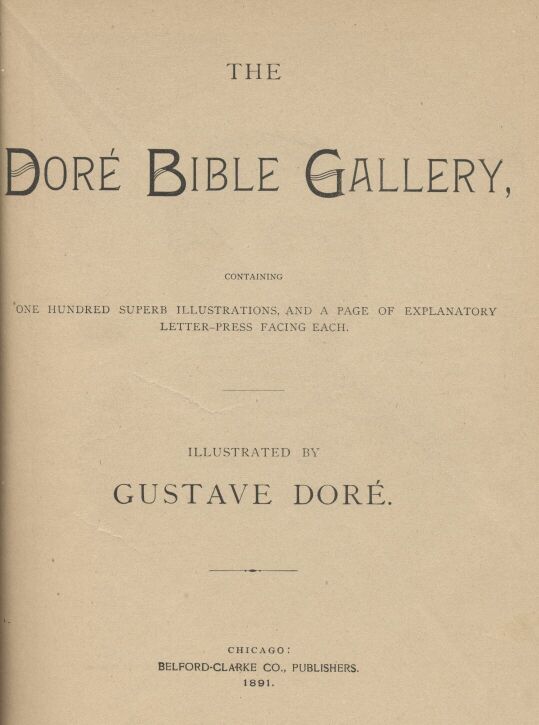
This volume, as its title indicates, is a collection of engravings illustrative of the Bible—the designs being all from the pencil of the greatest of modern delineators, Gustave Dore. The original work, from which this collection has been made, met with an immediate and warm recognition and acceptance among those whose means admitted of its purchase, and its popularity has in no wise diminished since its first publication, but has even extended to those who could only enjoy it casually, or in fragmentary parts. That work, however, in its entirety, was far too costly for the larger and ever-widening circle of M. Dore's admirers, and to meet the felt and often-expressed want of this class, and to provide a volume of choice and valuable designs upon sacred subjects for art-loving Biblical students generally, this work was projected and has been carried forward. The aim has been to introduce subjects of general interest—that is, those relating to the most prominent events and personages of Scripture—those most familiar to all readers; the plates being chosen with special reference to the known taste of the American people. To each cut is prefixed a page of letter-press—in, narrative form, and containing generally a brief analysis of the design. Aside from the labors of the editor and publishers, the work, while in progress, was under the pains-taking and careful scrutiny of artists and scholars not directly interested in the undertaking, but still having a generous solicitude for its success. It is hoped, therefore, that its general plan and execution will render it acceptable both to the appreciative and friendly patrons of the great artist, and to those who would wish to possess such a work solely as a choice collection of illustrations upon sacred themes.
The subject of this sketch is, perhaps, the most original and variously gifted designer the world has ever known. At an age when most men have scarcely passed their novitiate in art, and are still under the direction and discipline of their masters and the schools, he had won a brilliant reputation, and readers and scholars everywhere were gazing on his work with ever-increasing wonder and delight at his fine fancy and multifarious gifts. He has raised illustrative art to a dignity and importance before unknown, and has developed capacities for the pencil before unsuspected. He has laid all subjects tribute to his genius, explored and embellished fields hitherto lying waste, and opened new and shining paths and vistas where none before had trod. To the works of the great he has added the lustre of his genius, bringing their beauties into clearer view and warming them to a fuller life.
His delineations of character, in the different phases of life, from the horrible to the grotesque, the grand to the comic, attest the versatility of his powers; and, whatever faults may be found by critics, the public will heartily render their quota of admiration to his magic touch, his rich and facile rendering of almost every thought that stirs, or lies yet dormant, in the human heart. It is useless to attempt a sketch of his various beauties; those who would know them best must seek them in the treasure—house that his genius is constantly augmenting with fresh gems and wealth. To one, however, of his most prominent traits we will refer—his wonderful rendering of the powers of Nature.
His early wanderings in the wild and romantic passes of the Vosges doubtless developed this inherent tendency of his mind. There he wandered, and there, mayhap, imbibed that deep delight of wood and valley, mountain—pass and rich ravine, whose variety of form and detail seems endless to the enchanted eye. He has caught the very spell of the wilderness; she has laid her hand upon him, and he has gone forth with her blessing. So bold and truthful and minute are his countless representations of forest scenery; so delicate the tracery of branch and stem; so patriarchal the giant boles of his woodland monarchs, that the' gazer is at once satisfied and entranced. His vistas lie slumbering with repose either in shadowy glade or fell ravine, either with glint of lake or the glad, long course of some rejoicing stream, and above all, supreme in a beauty all its own, he spreads a canopy of peerless sky, or a wilderness, perhaps, of angry storm, or peaceful stretches of soft, fleecy cloud, or heavens serene and fair—another kingdom to his teeming art, after the earth has rendered all her gifts.
Paul Gustave Dore was born in the city of Strasburg, January 10, 1833. Of his boyhood we have no very particular account. At eleven years of age, however, he essayed his first artistic creation—a set' of lithographs, published in his native city. The following year found him in Paris, entered as a 7. student at the Charlemagne Lyceum. His first actual work began in 1848, when his fine series of sketches, the "Labors of Hercules," was given to the public through the medium of an illustrated, journal with which he was for a long time connected as designer. In 1856 were published the illustrations for Balzac's "Contes Drolatiques" and those for "The Wandering Jew "—the first humorous and grotesque in the highest degree—indeed, showing a perfect abandonment to fancy; the other weird and supernatural, with fierce battles, shipwrecks, turbulent mobs, and nature in her most forbidding and terrible aspects. Every incident or suggestion that could possibly make the story more effective, or add to the horror of the scenes was seized upon and portrayed with wonderful power. These at once gave the young designer a great reputation, which was still more enhanced by his subsequent works.
With all his love for nature and his power of interpreting her in her varying moods, Dore was a dreamer, and many of his finest achievements were in the realm of the imagination. But he was at home in the actual world also, as witness his designs for "Atala," "London—a Pilgrimage," and many of the scenes in "Don Quixote."
When account is taken of the variety of his designs, and the fact considered that in almost every task he attempted none had ventured before him, the amount of work he accomplished is fairly incredible. To enumerate the immense tasks he undertook—some single volumes alone containing hundreds of illustrations—will give some faint idea of his industry. Besides those already mentioned are Montaigne, Dante, the Bible, Milton, Rabelais, Tennyson's "Idyls of the King," "The Ancient Mariner, Shakespeare, "Legende de Croquemitaine," La Fontaine's "Fables," and others still.
Take one of these works—the Dante, La Fontaine, or "Don Quixote"—and glance at the pictures. The mere hand labor involved in their production is surprising; but when the quality of the work is properly estimated, what he accomplished seems prodigious. No particular mention need be made of him as painter or sculptor, for his reputation rests solely upon his work as an illustrator.
Dore's nature was exuberant and buoyant, and he was youthful in appearance. He had a passion for music, possessed rare skill as a violinist, and it is assumed that, had he failed to succeed with his pencil, he could have won a brilliant reputation as a musician.
He was a bachelor, and lived a quiet, retired life with his mother—married, as he expressed it, to her and his art. His death occurred on January 23, 1883.
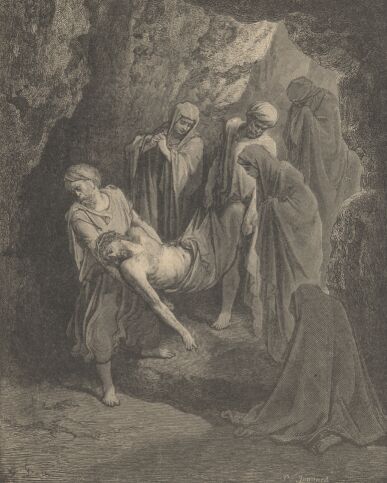
When the even was come, there came a rich man of Arimathea, named Joseph, who also himself was Jesus' disciple he went to Pilate, and begged the body of Jesus. Then Pilate commanded the body to be delivered. And when Joseph had taken the body, he wrapped it in a clean linen cloth, and laid it in his own new tomb, which he had hewn out in the rock: and he rolled a great stone to the door of the sepulchre, and departed.
And there was Mary Magdalene, and the other Mary, sitting over against the sepulchre.—Matthew xxvii, 57-61
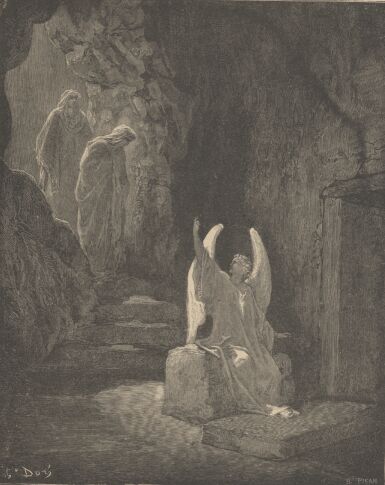
In the end of the sabbath, as it began to dawn toward the first day of the week, came Mary Magdalene and the other Mary to see the sepulchre.
And, behold, there was a great earthquake: for the angel of the Lord descended from, heaven, and came and rolled back the stone from the door, and sat upon it. His countenance was like lightning, and his raiment white as snow: and for fear of him the keepers did shake, and became as dead men.
And the angel answered and said unto the women, Fear not ye: for I know that ye seek Jesus, which was crucified. He is not here: for he is risen, as he said. Come, see the place where the Lord lay. And go quickly, and tell his disciples that he is risen from the dead and, behold, he goeth before you into Galilee; there shall ye see him: lo, I have told you.
And they departed quickly from the sepulchre with fear and great joy; and did run to bring his disciples word.—Matthew xxviii, 1-8.
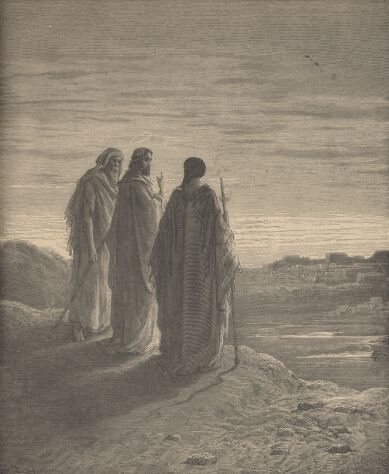
And, behold, two of them went that same day to a village called Emmaus which was from Jerusalem about threescore furlongs.
And they talked together of all these things which had happened. And it came to pass that, while they communed together and reasoned, Jesus himself drew near and went with them. But their eyes were holden that they should not know him.
And he said unto them, What manner of communications are these that ye have one to another, as ye walk, and are sad?
And the one of them, whose, name was Cleopas, answering said unto him, Art thou only a stranger in Jerusalem, and hast not known the things which are come to pass there in these days?
And he said unto them, What things?
And they said unto him, Concerning Jesus of Nazareth, which was a prophet mighty in deed and word before God and all the people: And how the chief priests and our rulers delivered him to be condemned to death, and have crucified him. But we trusted that it had been he which should have redeemed Israel: and beside all this, to-day is the third day since these things were done. Yea, and certain women also of our company made us astonished, which were early at the sepulchre; and when they found not his body, they came, saying, that they had also seen a vision of angels, which said that he was alive. And certain of them which were with us went to the sepulchre, and found it even so as the women had said: but him they saw not.
Then he said unto them, O fools, and slow of heart to believe all that the prophets have spoken: ought not Christ to have suffered these things, and to enter into his glory?
And beginning at Moses and all the prophets, he expounded unto them in all the scriptures the things concerning himself.
And they drew nigh unto the village, whither they went: and he made as though he would have gone further. But they constrained him, saying, Abide with us: for it is toward evening, and the day is far spent. And he went in to tarry with them.
And it came to pass, as he sat at meat with them, he took bread, and blessed it, and brake, and gave to them. And their eyes were opened, and they knew him; and he vanished out of their sight.
And they said one to another, Did not our heart burn within us, while he talked with us by the way, and while he opened to us the scriptures?
And they rose up the same hour, and returned to Jerusalem, and found the eleven gathered together, and them that were with them, saying, The Lord is risen indeed, and hath appeared to Simon.
And they told what things were done in the way, and how he was known of them in breaking of bread.—Luke xxiv, 13-35.
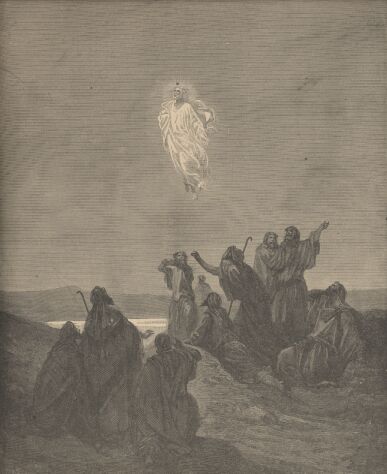
Now upon the first day of the week, very early in the morning, they came unto the sepulchre, bringing the spices which they had prepared, and certain others with them. And they found the stone rolled away from the sepulchre.
And they remembered his words. And returned from the sepulchre, and told all these things unto the eleven, and to all the rest. * * *
And, behold, two of them went that same day to a village called Emmaus, which was from Jerusalem about threescore furlongs. And they talked together of all these things which had happened. * * *
And they rose up the same hour, and returned to Jerusalem, and found the eleven gathered together, and them that were with them, saying, The Lord is risen indeed, and hath appeared to Simon. And they told what things were done in the way, and how he was known of them in breaking of bread. And as they thus spake, Jesus himself stood in the midst of them, and saith unto them, Peace be unto you. * * *
And, behold, I send the promise of my Father upon you: but tarry ye in the city of Jerusalem, until ye be endued with power from on high.
And he led them out as far as to Bethany, and he lifted up his hands, and blessed them. And it came to pass, while he blessed them, he was parted from them, and carried up into heaven. And they worshiped him, and returned to Jerusalem with great joy. Luke xxiv, 1-2, 8-9, 13-14, 33-36, 49-52.
The former treatise have I made, O Theophilus, of all that Jesus began both to do and teach, until the day in which he was taken up, after that he through the Holy Ghost had given commandments unto the apostles whom he had chosen: to whom also he shewed himself alive after his passion by many infallible proofs, being seen of them forty days, and speaking of the things pertaining to the kingdom of God: and, being assembled together with them, commanded them that they should not depart from Jerusalem, but, wait for the promise of the Father, which, saith he, ye have heard of me. For John truly baptized with water; but ye shall be baptized with the Holy Ghost not many days hence.
When they therefore were come together, they asked of him, saying, Lord, wilt thou at this time restore again the kingdom of Israel? And he said unto them, It is not for you to know the times or the seasons, which the Father hath put in his own power. But ye shall receive power, after that the Holy Ghost is come upon you: and ye shall be witnesses unto me both in Jerusalem, and all Judaea, and in Samaria, and unto the uttermost part of the earth.
And when he had spoken these things, while they beheld, he was taken up: and a cloud received him out of their sight. And while they looked steadfastly toward heaven as he went up, behold, two men stood by them in white apparel.—Acts i, 1-10
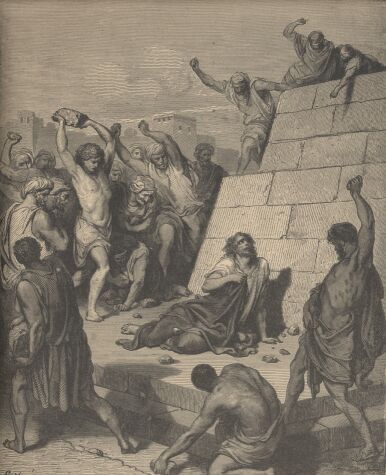
And Stephen, full of faith and power, did great wonders and miracles among the people.
Then there arose certain of the synagogue, which is called the synagogue of the Libertines, and Cyrenians, and Alexandrians, and of them of Cilicia and of Asia, disputing with Stephen. And they were not able to resist the wisdom and the spirit by which he spake. Then they suborned men, which said, We have heard him speak blasphemous words against Moses and against God. And they stirred up the people, and the elders, and the scribes, and came upon him, and caught him, and brought him to the council. And set up false witnesses, which said, This man ceaseth not to speak blasphemous words against this holy place, and the law: for we have heard him say, that this Jesus of Nazareth shall destroy this place, and shall change the customs which Moses delivered us.
And all that sat in the council, looking steadfastly on him, saw his face as it had been the face of an angel.
Then said the high priest, Are these things so?
And he said, Men, brethren, and fathers, hearken: [Stephen here makes his defense, concluding with a terrible, denunciation of the Jews as being stiffnecked and persecutors of their prophets, and as betrayers and murderers of Jesus Christ.]
When they heard these things, they were cut to the heart, and they, gnashed on him with their teeth.
But he, being full of the Holy Ghost, looked up steadfastly into heaven, and saw the glory of God, and Jesus standing on the right hand of God, and said, Behold, I see the heavens opened, and the Son of man standing on the right hand of God.
Then they cried out with a loud voice, and stopped their ears, and ran upon him with one accord, and cast him out of, the city, and stoned him: and the witnesses laid down their clothes at a young man's feet, whose name was Saul. And they stoned Stephen, calling upon God, and saying, Lord Jesus, receive my spirit.
And he kneeled down, and cried with a loud voice, Lord, lay not this sin to their charge. And when he had said this, he fell asleep.
And Saul was consenting unto his death.—Acts vi, 8-15; vii, 1-2, 54-56; viii, 1.
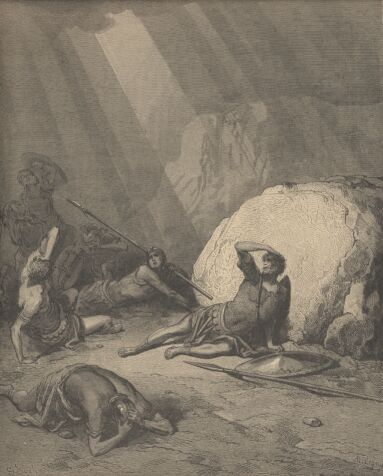
And Saul, yet breathing out threatenings and slaughter against the disciples of the Lord, went unto the high priest, and desired of him letters to Damascus to the synagogues, that if he found any of this way, whether they were men or women, he might bring them bound unto Jerusalem.
And as he journeyed, he came near Damascus: and suddenly there shined round about him a light from heaven: and he fell to the earth, and heard a voice, saying unto him, Saul, Saul, why persecutest thou me? And he said, Who art thou, Lord? And the Lord said, I am Jesus whom thou persecutest it is hard for thee to kick against the pricks. And he trembling and astonished said, Lord, what wilt thou have me to do? And the Lord said unto him, Arise, and go into the city, and it shall be told thee what thou must do.
And the men which journeyed with him stood speechless, hearing a voice, but seeing no man.
And Saul arose from the earth; and when his eyes were opened, he saw no man: but they led him by the hand, and brought him into Damascus. And he was three days without sight, and neither did eat nor drink.
And there was a certain disciple at Damascus, named Ananias; and to him said the Lord in a vision, Ananias. And he said, Behold, I am here, Lord.
And the Lord said unto him, Arise, and go into the street which is called Straight, and enquire in the house of Judas for one called Saul, of Tarsus: for, behold, he prayeth, and hath seen in a vision a man named Ananias coming in, and putting his hand on him, that he might receive his sight. Then Ananias answered, Lord, I have heard by many of this man, how much evil he hath done to thy saints at Jerusalem: and here he hath authority from the chief priests to bind all that call on thy name. But the Lord said unto him, Go thy way: for he is a chosen vessel unto me, to bear my name before the Gentiles, and kings, and the children of Israel: for I will shew him how great things he must suffer for my name's sake.
And Ananias went his way, and entered into the house; and putting his hands on him said, Brother Saul, the Lord, even Jesus, that appeared unto thee in the way as thou camest, hash sent me, that thou mightest receive thy sight, and be filled with the Holy Ghost. And immediately there fell from his eyes as it had been scales: and he received sight forthwith, and arose and was baptized. And when he had received meat, he was strengthened.
Then was Saul certain days with the disciples which were at Damascus. And straightway he preached Christ in the synagogues, that he is the Son of God.—Acts ix, 1-20.
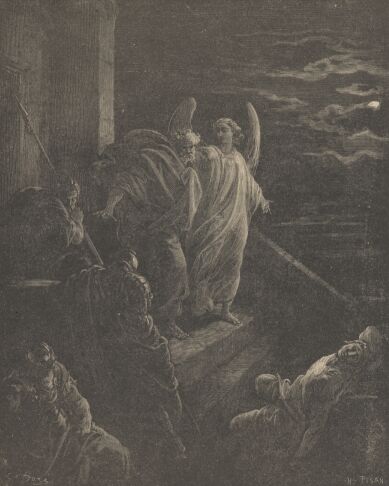
Now about that time Herod the king stretched forth his hands to vex certain of the church. And he killed James the brother of John with the sword.
And because he saw it pleased the Jews, he proceeded further to take Peter also. (Then were the days of unleavened bread.) And when he had apprehended him, he put him in prison, and delivered him to four quarternions of soldiers to keep him; intending after Easter to bring him forth to the people.
Peter therefore was kept in prison: but prayer was made without ceasing of the church unto God for him.
And when Herod would have brought him forth, the same night Peter was sleeping between two soldiers, bound with two chains: and the keepers before the door kept the prison. And, behold, the angel of the Lord came upon him, and a light shined in the prison: and he smote Peter on the side, and raised him up, saying, Arise up quickly. And his chains fell off from his hands. And the angel said unto him, Gird thyself, and bind on thy sandals: And so he did. And he saith unto him, Cast thy garment about thee, and follow me. And he went out, and followed him; and wist not that it was true which was done by the angel but thought he saw a vision. When they were past the first and the second ward, they came unto the iron gate that leadeth unto the city; which opened to them of his own accord and they went out and passed on through one street and forthwith the angel departed from him.
And when Peter was come to himself, he said, Now I know of a surety, that the Lord hath sent his angel, and hath delivered me out of the hand of Herod, and from all the expectation of the people of the Jews.—Acts xii, 1-11
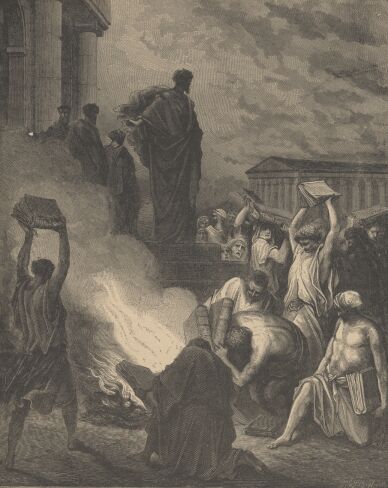
And it came to pass, that, while Apollos was at Corinth, Paul having passed through the upper coasts came to Ephesus; and finding certain disciples, he said unto them, Have ye, received the Holy Ghost since ye believed? And they said unto him, We have not so much as heard whether there be any Holy Ghost. And he, said unto them, Unto what then were ye baptized? And they said, Unto John's baptism. Then said Paul, John verily baptized with the baptism of repentance, saying unto the people, that they should believe on him which should come after him, that is, on Christ Jesus.
When they heard this, they were baptized in the name of the Lord Jesus. And when Paul had laid his hands upon them, the Holy Ghost came on them; and they spake with tongues, and prophesied. And all the men were about twelve.
And he went into the synagogue, and spake boldly for the space of three months, disputing and persuading the things concerning the kingdom of God.
But when divers were hardened, and believed not, but spake evil of that way before the multitude, he departed from them, and separated the disciples, disputing daily in the school of one Tyrannus. And this continued by the space of two years; so that all they which dwelt in Asia heard the word of the Lord Jesus, both Jews and Greeks.
And God wrought special miracles by the hands of Paul: so that from his body were brought unto the sick handkerchiefs or aprons, and the diseases departed from them, and the evil spirits went out of them.
Then certain of the vagabond Jews, exorcists, took upon them to call over them which had evil spirits the name of the Lord Jesus, saying, We adjure you by Jesus whom Paul preacheth. And there were seven sons of one Sceva, a Jew, and chief of the priests, which did so. And the evil spirit answered and said, Jesus I know, and Paul I know; but who are ye? And the man in whom the evil spirit was leaped on them, and overcame them, and prevailed against them, so that they fled out of that house naked and wounded.
And this was known to all the Jews and Greeks also dwelling at Ephesus; and fear fell on them all, and the name of the Lord Jesus was magnified. And many that believed came, and confessed, and shewed their deeds. Many of them also which used curious arts brought their books together, and burned them before all men: and they counted the price of them, and found it fifty thousand pieces of silver.
So mightily grew the word of God and prevailed.—Acts xix, 1—20.
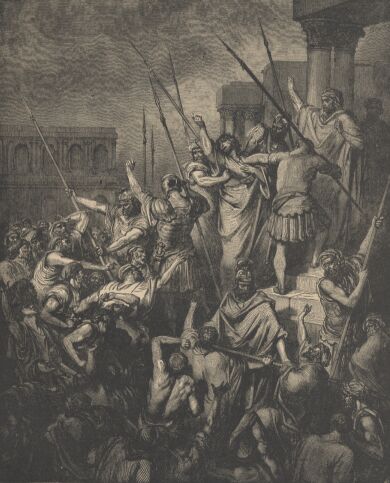
Do therefore this that we say to thee: We have four men which have a vow on them; them take, and purify thyself with them, and be at charges with them, that they may shave their heads: and all may know that those things, whereof they were informed concerning thee, are nothing; but that thou thyself also walkest orderly, and keepest the law.
Then Paul took the men, and the next day purifying himself with them entered into the temple, to signify the accomplishment of the days of purification, until that an offering should be offered for every one of them.
And when the seven days were almost ended, the Jews which were of Asia, when they saw him in the temple, stirred up all the people, and laid hands on him, crying out, Men of Israel, help: this is the man, that teacheth all men every where against the people, and the law, and this place: and further brought Greeks also into the temple, and hath polluted this holy place. (For they had seen before with him in the city Trophimus an Ephesian, whom they supposed that Paul had brought into the temple.)
And all the city was moved, and the people ran together: and they took Paul, and drew him out of the temple: and forthwith the doors were shut. And as they went about to kill him, tidings came unto the chief captain of the band, that all Jerusalem was in an uproar: who immediately took soldiers and centurions, and ran down unto them and when they saw the chief captain and the soldiers, they left beating of Paul. Then the chief captain came near, and took him, and commanded him to be bound with two chains; and demanded who he was, and what he had done. And some cried one thing, some another, among the multitude: and when he could not know the certainty for the tumult, he commanded him to be carried into the castle. And when he came upon the stairs, so it was, that he was borne of the soldiers for the violence of the people. For the multitude of the people followed after, crying, Away with him.
And as Paul was to be led into the castle, he said unto the chief captain, May I speak unto thee? Who said, Canst thou speak Greek? Art not thou that Egyptian, which before these days madest an uproar, and leddest out into the wilderness four thousand men that were murderers? But Paul said, I am a man which am a Jew of Tarsus, a city in Cilicia, a citizen of no mean city: and, I beseech thee, suffer me to speak unto the people.
And when he had given him license, Paul stood on the stairs, and beckoned with the hand unto the people. And when there was made a great silence, he spake unto them in the Hebrew tongue.—Acts xxi, 23-40.
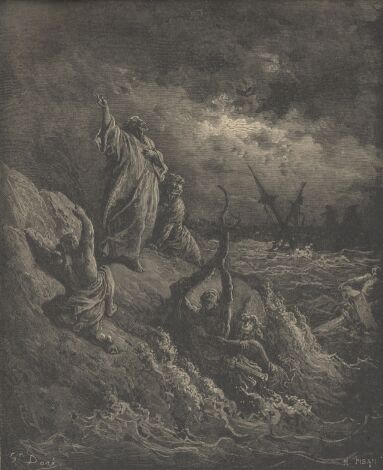
And while the day was coming on, Paul besought them all to take meat, saying, This day is the fourteenth day that ye have tarried and continued fasting, having taken nothing. Wherefore I pray you to take some meat; for this is for your health: for there shall not a hair fall from the head of any of you.
And when he had thus spoken, he took bread, and gave thanks to God in presence of them all; and when he had broken it, he began to eat. Then were they all of good cheer, and they also took some meat.
And we were in all in the ship two hundred threescore and sixteen souls.
And when they had eaten enough, they lightened the ship, and cast out the wheat into the sea. And when it was day, they knew not the land: but they discovered a certain creek with a shore, into the which they were minded, if it were possible, to thrust in the ship. And when they had taken up the anchors, they committed themselves unto the sea, and loosed the rudder bands, and hoised up the mainsail to the wind, and made toward shore. And falling into a place where two seas met, they ran the ship aground; and the forepart stuck fast, and remained unmovable, but the hinder part was broken with the violence of the waves. And the soldiers' counsel was to kill the prisoners, lest any of them should swim out, and escape. But the centurion, willing to save Paul, kept them from their purpose; and commanded that they which could swim should cast themselves first into the sea, and get to land: and the rest, some on boards, and some on broken pieces of the ship. And so it came to pass, that they escaped all safe to land.
And when they were escaped, then they knew that the island was called Melita.
And the barbarous people shewed us no little kindness: for they kindled a fire, and received us every one, because of the present rain, and because of the cold.—Acts xxvii, 33-44; xxviii, 1-2
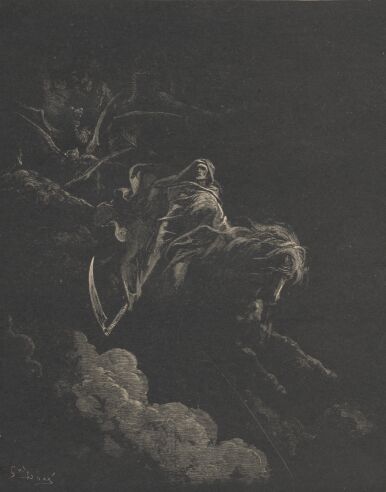
And when he had opened the fourth seal, I heard the voice of the fourth beast say, Come and see.
And I looked, and behold a pale horse: and his name that sat on him was Death, and Hell followed with him. And power was given unto them over the fourth part of the earth, to kill with sword, and with hunger, and with death, and with the beasts of the earth. Revelation vi, 7-8
End of the Project Gutenberg EBook of The Dore Gallery of Bible
Illustrations, Volume 9, by Anonymous, Illustrated by Gustave Dore
*** END OF THIS PROJECT GUTENBERG EBOOK DORE BIBLE GALLERY, VOL. 9 ***
***** This file should be named 8709-h.htm or 8709-h.zip *****
This and all associated files of various formats will be found in:
https://www.gutenberg.org/8/7/0/8709/
Produced by David Widger
Updated editions will replace the previous one--the old editions
will be renamed.
Creating the works from public domain print editions means that no
one owns a United States copyright in these works, so the Foundation
(and you!) can copy and distribute it in the United States without
permission and without paying copyright royalties. Special rules,
set forth in the General Terms of Use part of this license, apply to
copying and distributing Project Gutenberg-tm electronic works to
protect the PROJECT GUTENBERG-tm concept and trademark. Project
Gutenberg is a registered trademark, and may not be used if you
charge for the eBooks, unless you receive specific permission. If you
do not charge anything for copies of this eBook, complying with the
rules is very easy. You may use this eBook for nearly any purpose
such as creation of derivative works, reports, performances and
research. They may be modified and printed and given away--you may do
practically ANYTHING with public domain eBooks. Redistribution is
subject to the trademark license, especially commercial
redistribution.
*** START: FULL LICENSE ***
THE FULL PROJECT GUTENBERG LICENSE
PLEASE READ THIS BEFORE YOU DISTRIBUTE OR USE THIS WORK
To protect the Project Gutenberg-tm mission of promoting the free
distribution of electronic works, by using or distributing this work
(or any other work associated in any way with the phrase "Project
Gutenberg"), you agree to comply with all the terms of the Full Project
Gutenberg-tm License (available with this file or online at
https://gutenberg.org/license).
Section 1. General Terms of Use and Redistributing Project Gutenberg-tm
electronic works
1.A. By reading or using any part of this Project Gutenberg-tm
electronic work, you indicate that you have read, understand, agree to
and accept all the terms of this license and intellectual property
(trademark/copyright) agreement. If you do not agree to abide by all
the terms of this agreement, you must cease using and return or destroy
all copies of Project Gutenberg-tm electronic works in your possession.
If you paid a fee for obtaining a copy of or access to a Project
Gutenberg-tm electronic work and you do not agree to be bound by the
terms of this agreement, you may obtain a refund from the person or
entity to whom you paid the fee as set forth in paragraph 1.E.8.
1.B. "Project Gutenberg" is a registered trademark. It may only be
used on or associated in any way with an electronic work by people who
agree to be bound by the terms of this agreement. There are a few
things that you can do with most Project Gutenberg-tm electronic works
even without complying with the full terms of this agreement. See
paragraph 1.C below. There are a lot of things you can do with Project
Gutenberg-tm electronic works if you follow the terms of this agreement
and help preserve free future access to Project Gutenberg-tm electronic
works. See paragraph 1.E below.
1.C. The Project Gutenberg Literary Archive Foundation ("the Foundation"
or PGLAF), owns a compilation copyright in the collection of Project
Gutenberg-tm electronic works. Nearly all the individual works in the
collection are in the public domain in the United States. If an
individual work is in the public domain in the United States and you are
located in the United States, we do not claim a right to prevent you from
copying, distributing, performing, displaying or creating derivative
works based on the work as long as all references to Project Gutenberg
are removed. Of course, we hope that you will support the Project
Gutenberg-tm mission of promoting free access to electronic works by
freely sharing Project Gutenberg-tm works in compliance with the terms of
this agreement for keeping the Project Gutenberg-tm name associated with
the work. You can easily comply with the terms of this agreement by
keeping this work in the same format with its attached full Project
Gutenberg-tm License when you share it without charge with others.
1.D. The copyright laws of the place where you are located also govern
what you can do with this work. Copyright laws in most countries are in
a constant state of change. If you are outside the United States, check
the laws of your country in addition to the terms of this agreement
before downloading, copying, displaying, performing, distributing or
creating derivative works based on this work or any other Project
Gutenberg-tm work. The Foundation makes no representations concerning
the copyright status of any work in any country outside the United
States.
1.E. Unless you have removed all references to Project Gutenberg:
1.E.1. The following sentence, with active links to, or other immediate
access to, the full Project Gutenberg-tm License must appear prominently
whenever any copy of a Project Gutenberg-tm work (any work on which the
phrase "Project Gutenberg" appears, or with which the phrase "Project
Gutenberg" is associated) is accessed, displayed, performed, viewed,
copied or distributed:
This eBook is for the use of anyone anywhere at no cost and with
almost no restrictions whatsoever. You may copy it, give it away or
re-use it under the terms of the Project Gutenberg License included
with this eBook or online at www.gutenberg.org
1.E.2. If an individual Project Gutenberg-tm electronic work is derived
from the public domain (does not contain a notice indicating that it is
posted with permission of the copyright holder), the work can be copied
and distributed to anyone in the United States without paying any fees
or charges. If you are redistributing or providing access to a work
with the phrase "Project Gutenberg" associated with or appearing on the
work, you must comply either with the requirements of paragraphs 1.E.1
through 1.E.7 or obtain permission for the use of the work and the
Project Gutenberg-tm trademark as set forth in paragraphs 1.E.8 or
1.E.9.
1.E.3. If an individual Project Gutenberg-tm electronic work is posted
with the permission of the copyright holder, your use and distribution
must comply with both paragraphs 1.E.1 through 1.E.7 and any additional
terms imposed by the copyright holder. Additional terms will be linked
to the Project Gutenberg-tm License for all works posted with the
permission of the copyright holder found at the beginning of this work.
1.E.4. Do not unlink or detach or remove the full Project Gutenberg-tm
License terms from this work, or any files containing a part of this
work or any other work associated with Project Gutenberg-tm.
1.E.5. Do not copy, display, perform, distribute or redistribute this
electronic work, or any part of this electronic work, without
prominently displaying the sentence set forth in paragraph 1.E.1 with
active links or immediate access to the full terms of the Project
Gutenberg-tm License.
1.E.6. You may convert to and distribute this work in any binary,
compressed, marked up, nonproprietary or proprietary form, including any
word processing or hypertext form. However, if you provide access to or
distribute copies of a Project Gutenberg-tm work in a format other than
"Plain Vanilla ASCII" or other format used in the official version
posted on the official Project Gutenberg-tm web site (www.gutenberg.org),
you must, at no additional cost, fee or expense to the user, provide a
copy, a means of exporting a copy, or a means of obtaining a copy upon
request, of the work in its original "Plain Vanilla ASCII" or other
form. Any alternate format must include the full Project Gutenberg-tm
License as specified in paragraph 1.E.1.
1.E.7. Do not charge a fee for access to, viewing, displaying,
performing, copying or distributing any Project Gutenberg-tm works
unless you comply with paragraph 1.E.8 or 1.E.9.
1.E.8. You may charge a reasonable fee for copies of or providing
access to or distributing Project Gutenberg-tm electronic works provided
that
- You pay a royalty fee of 20% of the gross profits you derive from
the use of Project Gutenberg-tm works calculated using the method
you already use to calculate your applicable taxes. The fee is
owed to the owner of the Project Gutenberg-tm trademark, but he
has agreed to donate royalties under this paragraph to the
Project Gutenberg Literary Archive Foundation. Royalty payments
must be paid within 60 days following each date on which you
prepare (or are legally required to prepare) your periodic tax
returns. Royalty payments should be clearly marked as such and
sent to the Project Gutenberg Literary Archive Foundation at the
address specified in Section 4, "Information about donations to
the Project Gutenberg Literary Archive Foundation."
- You provide a full refund of any money paid by a user who notifies
you in writing (or by e-mail) within 30 days of receipt that s/he
does not agree to the terms of the full Project Gutenberg-tm
License. You must require such a user to return or
destroy all copies of the works possessed in a physical medium
and discontinue all use of and all access to other copies of
Project Gutenberg-tm works.
- You provide, in accordance with paragraph 1.F.3, a full refund of any
money paid for a work or a replacement copy, if a defect in the
electronic work is discovered and reported to you within 90 days
of receipt of the work.
- You comply with all other terms of this agreement for free
distribution of Project Gutenberg-tm works.
1.E.9. If you wish to charge a fee or distribute a Project Gutenberg-tm
electronic work or group of works on different terms than are set
forth in this agreement, you must obtain permission in writing from
both the Project Gutenberg Literary Archive Foundation and Michael
Hart, the owner of the Project Gutenberg-tm trademark. Contact the
Foundation as set forth in Section 3 below.
1.F.
1.F.1. Project Gutenberg volunteers and employees expend considerable
effort to identify, do copyright research on, transcribe and proofread
public domain works in creating the Project Gutenberg-tm
collection. Despite these efforts, Project Gutenberg-tm electronic
works, and the medium on which they may be stored, may contain
"Defects," such as, but not limited to, incomplete, inaccurate or
corrupt data, transcription errors, a copyright or other intellectual
property infringement, a defective or damaged disk or other medium, a
computer virus, or computer codes that damage or cannot be read by
your equipment.
1.F.2. LIMITED WARRANTY, DISCLAIMER OF DAMAGES - Except for the "Right
of Replacement or Refund" described in paragraph 1.F.3, the Project
Gutenberg Literary Archive Foundation, the owner of the Project
Gutenberg-tm trademark, and any other party distributing a Project
Gutenberg-tm electronic work under this agreement, disclaim all
liability to you for damages, costs and expenses, including legal
fees. YOU AGREE THAT YOU HAVE NO REMEDIES FOR NEGLIGENCE, STRICT
LIABILITY, BREACH OF WARRANTY OR BREACH OF CONTRACT EXCEPT THOSE
PROVIDED IN PARAGRAPH F3. YOU AGREE THAT THE FOUNDATION, THE
TRADEMARK OWNER, AND ANY DISTRIBUTOR UNDER THIS AGREEMENT WILL NOT BE
LIABLE TO YOU FOR ACTUAL, DIRECT, INDIRECT, CONSEQUENTIAL, PUNITIVE OR
INCIDENTAL DAMAGES EVEN IF YOU GIVE NOTICE OF THE POSSIBILITY OF SUCH
DAMAGE.
1.F.3. LIMITED RIGHT OF REPLACEMENT OR REFUND - If you discover a
defect in this electronic work within 90 days of receiving it, you can
receive a refund of the money (if any) you paid for it by sending a
written explanation to the person you received the work from. If you
received the work on a physical medium, you must return the medium with
your written explanation. The person or entity that provided you with
the defective work may elect to provide a replacement copy in lieu of a
refund. If you received the work electronically, the person or entity
providing it to you may choose to give you a second opportunity to
receive the work electronically in lieu of a refund. If the second copy
is also defective, you may demand a refund in writing without further
opportunities to fix the problem.
1.F.4. Except for the limited right of replacement or refund set forth
in paragraph 1.F.3, this work is provided to you 'AS-IS' WITH NO OTHER
WARRANTIES OF ANY KIND, EXPRESS OR IMPLIED, INCLUDING BUT NOT LIMITED TO
WARRANTIES OF MERCHANTIBILITY OR FITNESS FOR ANY PURPOSE.
1.F.5. Some states do not allow disclaimers of certain implied
warranties or the exclusion or limitation of certain types of damages.
If any disclaimer or limitation set forth in this agreement violates the
law of the state applicable to this agreement, the agreement shall be
interpreted to make the maximum disclaimer or limitation permitted by
the applicable state law. The invalidity or unenforceability of any
provision of this agreement shall not void the remaining provisions.
1.F.6. INDEMNITY - You agree to indemnify and hold the Foundation, the
trademark owner, any agent or employee of the Foundation, anyone
providing copies of Project Gutenberg-tm electronic works in accordance
with this agreement, and any volunteers associated with the production,
promotion and distribution of Project Gutenberg-tm electronic works,
harmless from all liability, costs and expenses, including legal fees,
that arise directly or indirectly from any of the following which you do
or cause to occur: (a) distribution of this or any Project Gutenberg-tm
work, (b) alteration, modification, or additions or deletions to any
Project Gutenberg-tm work, and (c) any Defect you cause.
Section 2. Information about the Mission of Project Gutenberg-tm
Project Gutenberg-tm is synonymous with the free distribution of
electronic works in formats readable by the widest variety of computers
including obsolete, old, middle-aged and new computers. It exists
because of the efforts of hundreds of volunteers and donations from
people in all walks of life.
Volunteers and financial support to provide volunteers with the
assistance they need, is critical to reaching Project Gutenberg-tm's
goals and ensuring that the Project Gutenberg-tm collection will
remain freely available for generations to come. In 2001, the Project
Gutenberg Literary Archive Foundation was created to provide a secure
and permanent future for Project Gutenberg-tm and future generations.
To learn more about the Project Gutenberg Literary Archive Foundation
and how your efforts and donations can help, see Sections 3 and 4
and the Foundation web page at https://www.pglaf.org.
Section 3. Information about the Project Gutenberg Literary Archive
Foundation
The Project Gutenberg Literary Archive Foundation is a non profit
501(c)(3) educational corporation organized under the laws of the
state of Mississippi and granted tax exempt status by the Internal
Revenue Service. The Foundation's EIN or federal tax identification
number is 64-6221541. Its 501(c)(3) letter is posted at
https://pglaf.org/fundraising. Contributions to the Project Gutenberg
Literary Archive Foundation are tax deductible to the full extent
permitted by U.S. federal laws and your state's laws.
The Foundation's principal office is located at 4557 Melan Dr. S.
Fairbanks, AK, 99712., but its volunteers and employees are scattered
throughout numerous locations. Its business office is located at
809 North 1500 West, Salt Lake City, UT 84116, (801) 596-1887, email
business@pglaf.org. Email contact links and up to date contact
information can be found at the Foundation's web site and official
page at https://pglaf.org
For additional contact information:
Dr. Gregory B. Newby
Chief Executive and Director
gbnewby@pglaf.org
Section 4. Information about Donations to the Project Gutenberg
Literary Archive Foundation
Project Gutenberg-tm depends upon and cannot survive without wide
spread public support and donations to carry out its mission of
increasing the number of public domain and licensed works that can be
freely distributed in machine readable form accessible by the widest
array of equipment including outdated equipment. Many small donations
($1 to $5,000) are particularly important to maintaining tax exempt
status with the IRS.
The Foundation is committed to complying with the laws regulating
charities and charitable donations in all 50 states of the United
States. Compliance requirements are not uniform and it takes a
considerable effort, much paperwork and many fees to meet and keep up
with these requirements. We do not solicit donations in locations
where we have not received written confirmation of compliance. To
SEND DONATIONS or determine the status of compliance for any
particular state visit https://pglaf.org
While we cannot and do not solicit contributions from states where we
have not met the solicitation requirements, we know of no prohibition
against accepting unsolicited donations from donors in such states who
approach us with offers to donate.
International donations are gratefully accepted, but we cannot make
any statements concerning tax treatment of donations received from
outside the United States. U.S. laws alone swamp our small staff.
Please check the Project Gutenberg Web pages for current donation
methods and addresses. Donations are accepted in a number of other
ways including including checks, online payments and credit card
donations. To donate, please visit: https://pglaf.org/donate
Section 5. General Information About Project Gutenberg-tm electronic
works.
Professor Michael S. Hart was the originator of the Project Gutenberg-tm
concept of a library of electronic works that could be freely shared
with anyone. For thirty years, he produced and distributed Project
Gutenberg-tm eBooks with only a loose network of volunteer support.
Project Gutenberg-tm eBooks are often created from several printed
editions, all of which are confirmed as Public Domain in the U.S.
unless a copyright notice is included. Thus, we do not necessarily
keep eBooks in compliance with any particular paper edition.
Most people start at our Web site which has the main PG search facility:
https://www.gutenberg.org
This Web site includes information about Project Gutenberg-tm,
including how to make donations to the Project Gutenberg Literary
Archive Foundation, how to help produce our new eBooks, and how to
subscribe to our email newsletter to hear about new eBooks.